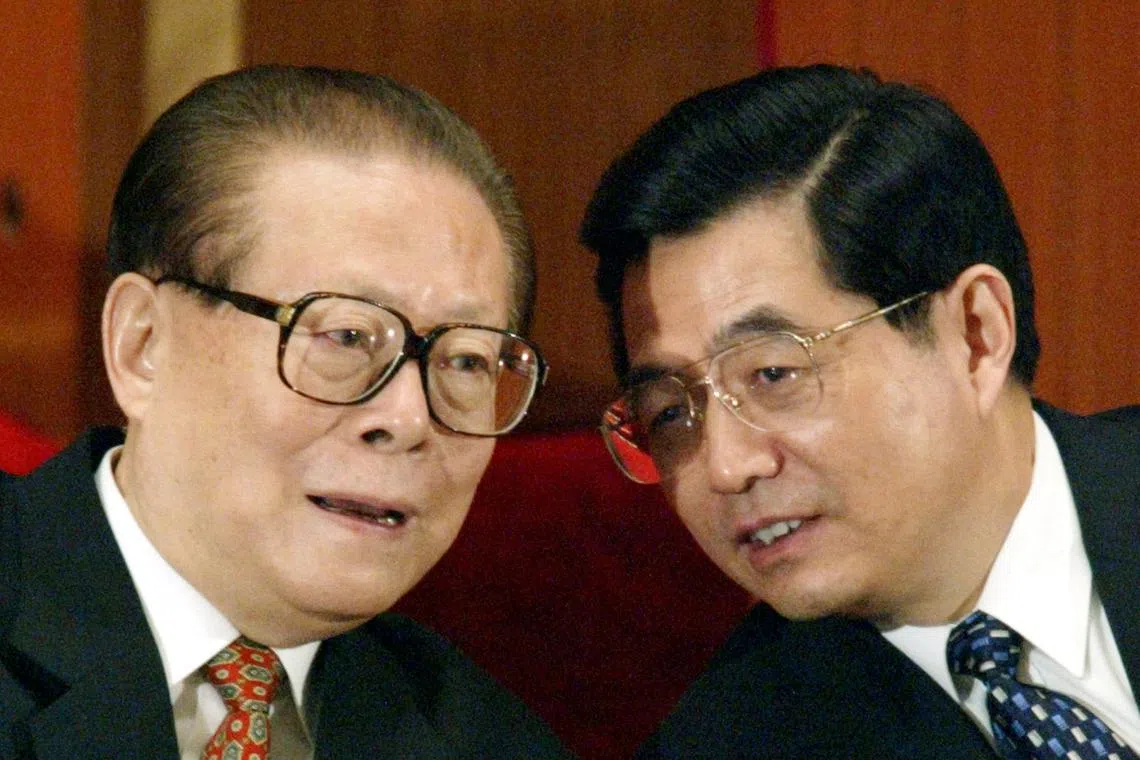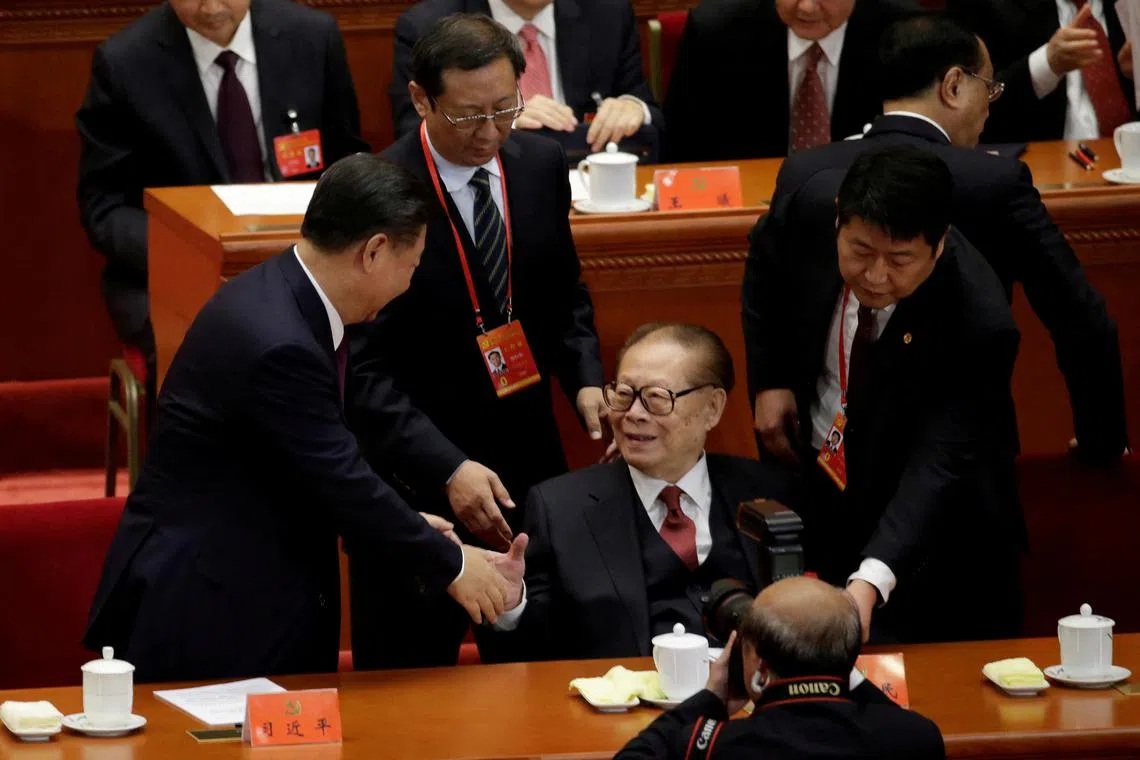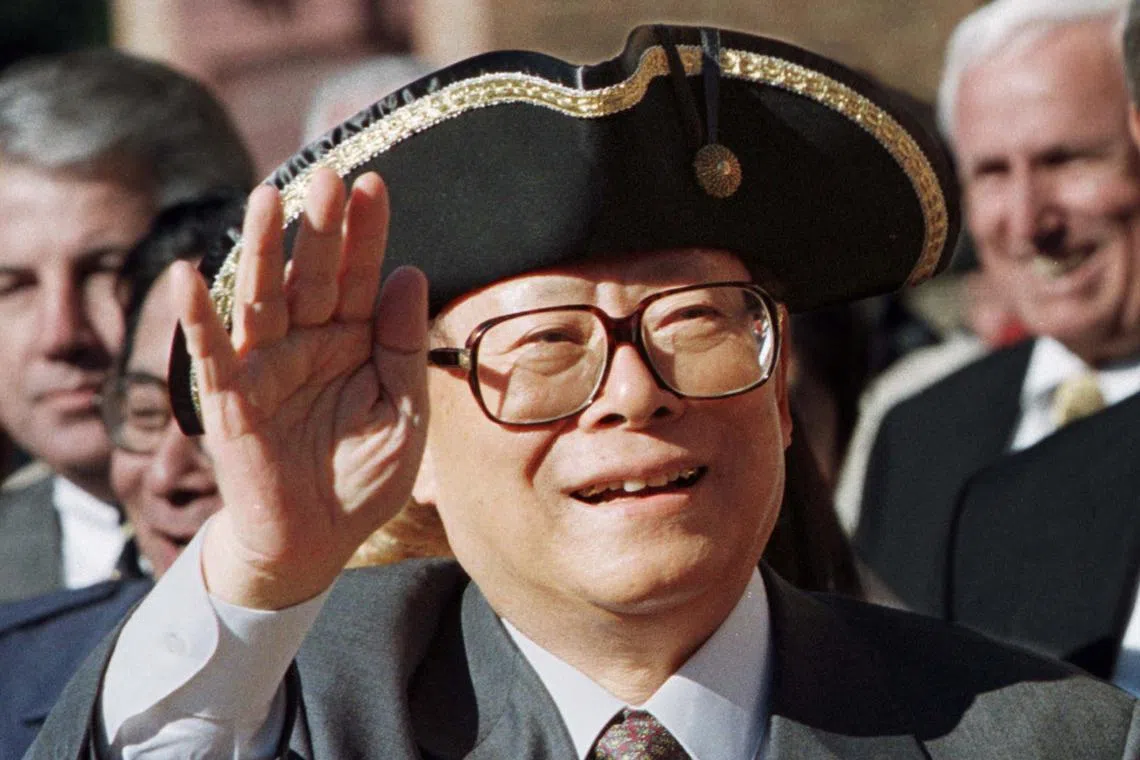WTO, liberalisation and diplomatic charm: Jiang Zemin will be remembered for these and more
Sign up now: Get insights on Asia's fast-moving developments
BEIJING - For the haves of Chinese society, former president Jiang Zemin will be fondly remembered for China’s accession to the World Trade Organisation (WTO) in 2001 – then a contentious move but one that helped to elevate China to its status as the world’s second-biggest economy in just a decade.
In 2002, he opened the doors of the Communist Party of China (CPC) to private entrepreneurs, going against the grain of Marxist theory that views businessmen as exploiters of workers. There was hostile reception from the Maoist wing of the party and more than a few quit in protest.
But Mr Jiang recognised the realities of the growing influence of capitalists in China. To ignore them – and some were already Communist Party members – would be to alienate an increasingly powerful class. Co-opting them seemed to make more sense.
Handpicked by then paramount leader Deng Xiaoping to become CPC general secretary in 1989 after a military crackdown on the Tiananmen pro-democracy protests, Mr Jiang pursued Mr Deng’s reforms and opening-up policy. By 2018, about 700 million Chinese, or about half of the population, were classified as middle class.
But for the have-nots of society and neo-Maoists, Mr Jiang’s efforts to commercialise education, healthcare and housing widened the wealth gap and led to greater polarity.
In the 1990s, with Mr Jiang’s support, then Premier Zhu Rongji reformed lumbering state-owned enterprises, shutting, merging or selling off underperformers and laying off millions of workers.
Mr Jiang was reviled by Falungong for outlawing the spiritual group as a “cult” in 1999. The group has accused China of murdering adherents in a brutal crackdown and harvesting their organs for transplant. Beijing denies the charges.
He also rounded up the founders and members of the China Democracy Party in 1998, vowing to “nip in the bud” any threats – real or perceived – to CPC rule.
Mr Jiang was not particularly appreciated as a leader when he was in power. He treaded a middle path, inviting criticism from the left for not doing enough to liberalise China, and from the right for straying too far from Marxism.
However, in today’s atmosphere of greater concentration of power in the hands of one man, tighter control of the media and academia, and some rollback of reforms, there is growing nostalgia for Mr Jiang and the relative freedom of his era.
He will be missed by Chinese increasingly frustrated by President Xi Jinping and his policies,
“Those who are uncomfortable with the direction Xi is taking China will remember more positively the Jiang tenure and, thus, Jiang,” said Professor Steve Tsang at the SOAS China Institute in London.
Mr Jiang broke China out of diplomatic isolation post-Tiananmen. He menaced Taiwan with war games in the run-up to the island’s first direct presidential election in 1996.
He also prevented bilateral ties with the United States from deteriorating in the wake of the 1999 bombing of the Chinese embassy in Belgrade and the 2001 collision between a Chinese fighter jet and a US spy plane over China’s southernmost province of Hainan.
Mr Jiang and Mr Zhu also took the unpopular decision to speed up China’s accession to the WTO.
“There was tremendous opposition to China’s accession to the WTO from the central government, the ministries and particularly from the provinces. Leaders from agricultural provinces were afraid that their agricultural sector would be overwhelmed by cheap and better produce from the United States and other countries,” Hong Kong-based sinologist Willy Lam said.
Joining the WTO opened up China’s market to international trade and investment, and the world’s economy to China’s exports. Importantly, it sped up reforms that raised the country’s ability to meet foreign competition.
However, the unbridled growth brought greater inequality to Chinese society and environmental damage that the country is grappling with today. Corruption also grew under Mr Jiang’s watch.
Prof Tsang said Mr Jiang’s most important achievement was that he largely kept to the succession arrangement decided by Mr Deng and handed over the reins of power peacefully to Mr Hu Jintao in 2002.
It was the first smooth and peaceful transition of power in the CPC since its founding in 1921. Before that, power struggles and purges, including bloody ones, marked successions of authority.

Mr Jiang Zemin (left) handing over the reins to Mr Hu Jintao in 2002 was the first smooth and peaceful transition of power in the CPC since its founding.
PHOTO: REUTERS
But the handover of power to Mr Hu was not complete and was seen as a blot on Mr Jiang’s record.
He did not retire fully in 2002, holding on to the position of chairman of the party’s Central Military Commission (CMC) until 2004 and the state CMC until 2005.
Although he fully retired in 2005, Mr Jiang continued to wield influence, as he retained the loyalty of the generals, two of whose promotion to top positions in the CMC he had a hand in.
He was also instrumental in picking Mr Xi Jinping as successor to Mr Hu, whose preference was current Premier Li Keqiang.
Mr Xi, however, targeted Mr Jiang’s proteges and followers after he came to power through his anti-corruption campaign, thus reducing Mr Jiang’s power and influence, said Prof Tsang.

Chinese President Xi Jinping (left) greeting former Chinese president Jiang Zemin after the opening of the Communist Party of China’s congress in Beijing in 2017.
PHOTO: REUTERS
Roots and legacy
If Mr Jiang appeared to be more liberal than his two successors – Mr Hu emphasised fairer distribution of wealth while Mr Xi is a political conservative – it could be because of his Shanghai roots.
Born in 1926, Mr Jiang grew up in the city known as the Paris of the East before the communist era, sophisticated and cosmopolitan.
He learnt English in school and studied the speeches of American presidents Thomas Jefferson and Abraham Lincoln.
In 2000, appearing in a segment of the popular American news programme 60 Minutes, he recited part of Lincoln’s Gettysburg address in English.
He studied electrical engineering at Shanghai Jiaotong University and was reported to have harboured the ambition of going to the Massachusetts Institute of Technology.

Then Chinese President Jiang Zemin wearing an 18th-century American colonial tricorn hat during a tour of Colonial Williamsburg, Virginia, in 1997.
PHOTO: REUTERS
Later in his early career in government, he was involved in foreign trade and the opening of the special economic zones in his various positions, including as Vice-Minister of the State Foreign Investment Commission and Minister of Electronics Industry.
He played the piano, flute, ukulele, Hawaiian guitar, organ and the Chinese erhu, and played a steel guitar on a trip to Hawaii and church organs on trips to Finland and Holland.
He also liked to sing and dance. In 1982, he waltzed and sang One Day When We Were Young with then San Francisco Mayor Dianne Feinstein, now a senator. As president, he serenaded US president George W. Bush at a banquet and waltzed with his national security adviser Condoleezza Rice.
Mr Jiang also liked watching American movies and read the works of Charles Dickens, Johann Wolfgang von Goethe, Emily Bronte and Mark Twain, according to some reports.
Within the CPC, he was criticised as pro-West and pro-American.
But his background meant that he was good for the opening up and the integration of the Chinese market with the international economy.
While Mr Jiang arrested some dissidents, radical intellectuals could speak their mind and the intellectual atmosphere was much less stultifying and stifling than it is now, said Dr Lam.


